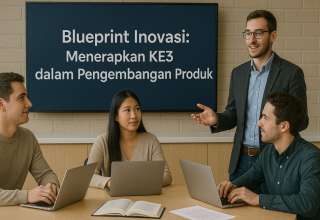*) Gambar sebagai ilustrasi
Mudzakarah (Exchange of Knowledge and Thought) as the First Step Toward Meaningful Change
On the journey toward Never Ending Improvement (NEI), the first and most fundamental step is building shared awareness. This awareness does not arise spontaneously; it is formed through the exchange of ideas, open discussion, and the exploration of knowledge beyond the routines of work. This is where Mudzakarah plays a vital role — a process of sharing knowledge and wisdom that becomes the foundation for any meaningful transformation.
The Purpose of Mudzakarah
Etymologically, the word mudzakarah stems from dzikr, meaning “to remember” or “to recall.” In the context of personal and organizational development, mudzakarah is more than an ordinary discussion; it is a space to revive intellectual and spiritual awareness that may lie dormant amid daily routines. Its purposes include:
- Stimulating the exploration of new ideas and insights
- Creating a collective reflective space
- Awakening awareness of issues and opportunities
- Inspiring change that originates from within
Mudzakarah encourages active participation, breaks down barriers between hierarchical levels or generations, and creates a liberated, meaningful learning environment.
Inspiring Practices of Mudzakarah
1. Weekly “Study & Innovation Circles” for Work Teams
Imagine if, each week, your team gathered not just to complete tasks, but to engage in meaningful study — reading books together, watching educational videos, or discussing industry issues. This is not a formal or pressured setting, but a safe space to ask questions, listen deeply, and grow.
Topics can be light yet profound, such as:
- “Why do great ideas often fail?”
- “What can we learn from failed startups?”
- “How do Qur’anic verses about hard work relate to KPIs?”
With just 60–90 minutes per week, this forum can become a refreshing source of inspiration for your team.
2. Cross-Departmental Collaborative Learning Sessions
Often, the best insights come from outside our own department. That’s why it’s important to facilitate cross-unit discussions — for example, marketing teams engaging with production teams, or HR dialoguing with finance.
Each session can focus on one case study:
- A success story of innovation
- The latest digital trends in a particular sector
- Best practices from other relevant organizations
The goal isn’t to determine who knows the most, but to complement each other, understand diverse perspectives, and expand ways of thinking.
3. Intergenerational Mudzakarah: Experience Meets Fresh Energy
In organizations or communities, generational differences often create distance. Mudzakarah can bridge the wisdom of senior generations with the energy and fresh ideas of younger ones.
Examples include:
- “Work talk” sessions between junior and senior employees
- Reflections on timeless work values
- Sharing stories of failure and success across generations
This approach cultivates a learning culture built on mutual support rather than blame.
Reviving Mudzakarah Through Value and Meaning
4. Thematic Qur’anic Interpretation as Learning
A unique approach to mudzakarah is connecting Qur’anic verses with contemporary work and life contexts. For example:
- Verses on trust linked to project management
- The story of Prophet Yusuf connected to leadership and integrity
- Interpretations of verses about time in the context of priority management
This type of mudzakarah enriches participants intellectually and spiritually. It strengthens intentions, purifies goals, and fosters a values-based work ethic — not just number-driven performance.
Innovative Spaces to Sustain Engagement
5. Monthly Mini Bootcamps: Wisdom Behind Innovation
Each month, organize a one-day bootcamp themed around “the wisdom behind innovation.”
Flexible topic examples include:
- “Why great ideas need momentum”
- “Ethics in digital product development”
- “How to avoid burnout during innovation”
These bootcamps can feature external speakers, internal facilitators, or even fully self-led team activities. Most importantly, they’re not just for skill upgrades — they are spaces for exploring meaning behind innovation.
6. Internal Podcast: Voices of Inspiration
Podcasts are a highly effective modern medium for sharing ideas and experiences. In the mudzakarah context, an organization or community can develop internal podcasts featuring:
- Interviews with inspiring internal figures
- Failure stories that became valuable lessons
- Reflections from leadership on the organization’s vision
- Inter-departmental dialogues on transformation
These podcasts can be accessed anytime, anywhere, and even serve as conversation starters in future mudzakarah sessions.
Long-Term Benefits of Mudzakarah
When mudzakarah becomes a part of organizational culture, it creates a vibrant learning ecosystem. Some of the long-term benefits include:
- Enhancing strategic and reflective thinking literacy
- Strengthening ownership of change
- Encouraging active participation in innovation
- Promoting lifelong learning
- Building adaptive and purpose-driven work character
Most importantly, mudzakarah creates a clear space for thought before moving into musyawarah and mujahadah in the 4M cycle.
Closing Thoughts
Mudzakarah is not an optional add-on. It is the foundation.
Before we can change, we must first become aware of what needs to change.
And before awareness, we must dare to speak, listen, and open our minds.
With regular, warm, and meaningful mudzakarah, an organization doesn’t just grow technically — it evolves spiritually and socially.
Let us embrace mudzakarah as the first step toward holistic and sustainable transformation.
Because every great change begins with a small, meaningful conversation.
If you have any questions about our training, mentoring, planning, or development services — or are interested in collaborating — please feel free to contact us at: haitan.rachman@inosi.co.id




